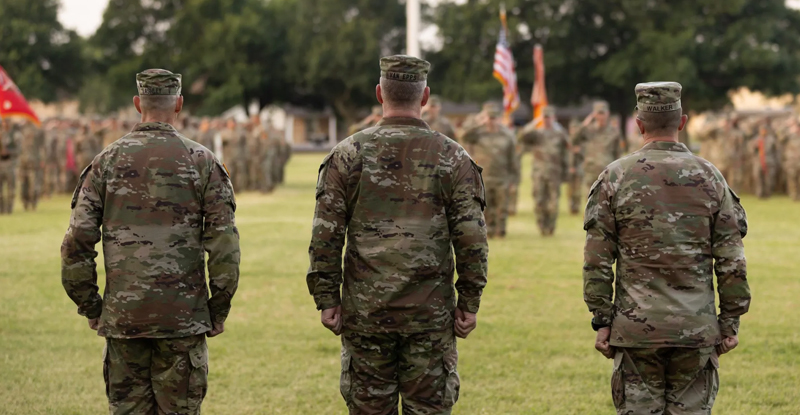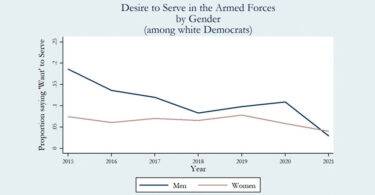Comment on article from STARRS Vice Chairman Maj General Joe Arbuckle, USA ret:
“This is fantastic! DEI made it easy for disgruntled troops to make a false accusation about a superior regarding trivial things related to the identity focus on race, gender, sexual orientation, etc.
This created an extremely caustic environment for those in leadership positions, especially commanders.
As Pete Hegseth described it, they were indeed walking on eggshells and because of that failed to take proper disciplinary actions just to avoid the retribution that could come from doing their jobs.
This DEI phenomenon certainly exists in other Services so I hope that the SECDEF takes a similar stance for all branches of the Armed Forces.
This new approach will let commanders be commanders and leaders be leaders. Great news.”
—
By Patty Nieberg | Task & Purpose
The Army has made changes in how it investigates misconduct allegations with new rules that may muddy the waters for soldiers making anonymous reports of misconduct like toxic leadership or hazing, former military lawyers warned.
The updated rules also stop the flagging of an accused soldier’s personnel record in advance of an investigation, which could delay career progression, and introduce punishments for soldiers proven to have made false accusations.
The changes came in a June update to the Army’s 15-6 regulation, which governs the process for investigating military-related misconduct like sexual harassment, toxic leadership, adultery, fraternization, cruelty and maltreatment of subordinates, violation of orders and regulations, misuse of government resources, and hazing.
The new regulation introduces several new terms that add new processes or concepts into the framework of a 15-6 investigation. Those investigations can lead to administrative punishments or more serious Uniformed Code of Military Justice proceedings that result in discharges or rank and grade demotions.
An Army official told Task & Purpose that the goal is to reduce the number of 15-6 investigations and “clarify” for commanders, especially for junior officers, that there are other processes — like a memorandum for records — they are encouraged to use for “everyday friction” within their command and when there’s not “sufficient evidence.”
The regulation changes follow an April 23 memo from Secretary of Defense Pete Hegseth, that ordered changes to the investigation process and including new terminology used verbatim in the new Army regulation. Hegseth referred to it as the “No More Walking On Eggshells Policy,” in a video posted to X on April 25.
“Too often at the Defense Department, there are complaints made for certain reasons that can’t be verified that end people’s career, either through [Equal Opportunity] or the [Inspector General]. We need to reform that process completely so commanders can be commanders,” Hegseth said in the video.
Introducing the “No More Walking On Eggshells” policy. pic.twitter.com/zOcAW2z2X7
— Secretary of Defense Pete Hegseth (@SecDef) April 25, 2025
‘Credible evidence’
The largest change to the 15-6 investigation process is the addition of a new “credibility” review at the early stage of some complaints. Traditionally, an Army 15-6 investigation had three fact-finding or evidence-gathering phases: preliminary inquiries, administrative investigations and boards of officers.
The new regulation now lays out an additional phase, called a “credibility assessment,” which would precede the three other phases, and possibly short-circuit the full investigation. The regulation states that officials receiving the complaint should initially review “to determine if sufficient credible information exists to warrant further fact-finding or evidence-gathering.”
The assessment is based on language used in Hegseth’s memo, for “credible” evidence or information which is defined as “attributable or corroborated information,” that considers “the original source, the nature of the information, and the totality of the circumstances” to determine if it is “sufficient” for investigators to pursue an inquiry.
Rachel VanLandingham, a former Air Force lawyer, said information needing to be “corroborated” or “attributed” could mean that an anonymous report will not be sufficient enough to “trigger” a 15-6 investigation. She said this could impact inquiries into hostile work environments because of toxic leaders.
“You need anonymous complaints because people are afraid of their commanders and if their commanders are retributive and hostile and toxic, you’re not going to leave your name,” VanLandingham said. “If you have a bunch of folks in a unit that are really afraid of their commander, they don’t want to say anything so they leave a bunch of anonymous complaints that’s not corroborated and that’s not attributable to anybody. But damn straight, the higher level commander — when he’s got 10 of these — should be investigating.”
The Army official said that not knowing the source prevents investigators from asking follow-up questions and that a “vague anonymous complaint” is “probably not actionable” because investigators cannot ask follow-up questions that would establish credibility.
False accusations
Hegseth’s memo also called for “disciplinary actions against personnel who knowingly submit false complaints,” a topic which now has its own new section in the Army 15-6 manual.
According to the new language, soldiers can face punitive measures for “knowingly” or “repeatedly” submitting false and “frivolous” allegations that could trigger investigations. The manual defines frivolous allegations as those “that a reasonable person knows has no merit,” and which were made for “an unreasonable purpose” like harassment.
Military justice lawyers told Task & Purpose the focus on punishing accusations deemed as false could have a chilling effect on victims of sexual harassment coming forward. Under current rules, formal reports of sexual harassment cannot be made anonymously.
Four former military lawyers told Task & Purpose that proving a false allegation would require a high standard of proof, which makes the new rule appear to be more of a message to discourage reports than an actual enforcement mechanism.
Barb Snow, a former active duty and Reserve Army jag officer for 11 years, pointed out that making false official statements is already an offense under the Uniform Code of Military Justice.
“Making the AR-15-6 process a quasi-criminal offense investigation process” will dissuade troops from coming forward, she said.
Retired Col. Don Christensen, former chief prosecutor for the Air Force and the former president for Protect Our Defenders, said the new language reflects an ongoing conversation within military circles around sexual harassment. He said he worries that victims will fear punishment, and retaliation for a report that isn’t substantiated with enough evidence to pursue legal or administrative actions.
“My biggest concern isn’t so much that people will be prosecuted for it, but that it will chill people from coming forward,” Christensen said. “There’s always been this, I would say undercurrent, of people in the military who very much want to punish, particularly women who come forward, and if that doesn’t result in a conviction, then they immediately label it a false allegation. There’s a huge difference between being able to get a conviction and something being false.”
No more flagging
Under the new rules, soldiers can still find their personnel records “flagged” during the formal evidence-gathering phase of a 15-6 investigation, which soldiers have long complained can impact promotions or delay base moves. But during a credibility assessment, soldiers will not be flagged.
Daniel Conway, a former Marine staff sergeant and captain who currently represents service members at military trials, said flagging can be “really disruptive” because it can interrupt deployments or assignments.
“If you’re a command sergeant major and you get accused of making inappropriate comments, you wind up with a 15-6,” he said. “It takes four, five, six months. You’ve now been rendered pretty much useless to the Army for half a year.”
Conway said he thinks the changes will cut down the number of 15-6 investigations for more minor issues.
“Being in San Antonio, we have a training command here with drill sergeants, and I’m constantly over the years representing drill sergeants who are being subjected to 15-6 investigations on frivolous complaints from trainees — really the most minor of stuff.”
Robert Capovilla, a former Army lawyer who currently represents troops in military cases, said the changes will be most relevant for sexual harassment cases where “the allegation itself ends that soldier’s career.”
“The dirty secret of military justice is, a lot of these people who are flagged for prolonged periods of time, even if they end up winning their case, the damage to their career is irreversible,” Capovilla said.
The regulation states that the Army will appoint specially trained investigative officers outside the chain of command of the reporter and subject to handle administrative investigations of formal sexual harassment complaints.
Capovilla called it a welcome change.
“We’ve seen untrained investigating officers who do not understand the definition of sexual harassment come back and almost universally conclude that sexual harassment occurred,” he said.
“Then those soldiers and airmen and Marines and everything are facing separation boards or boards of inquiry based on nothing but an amateur investigation that was done by somebody who didn’t even understand what they were doing.”
First published on Task & Purpose
Comments from the article:
“This is a great thing to happen, the amount of false, exaggerated or just spiteful IG reports would surprise most people. The motivation is everything from inter-office politics, revenge for a poor eval/fitrep, for a perceived slight or what they perceive as unfairness that will have nothing to do with the IG complaint. This is a good move.”
“In case anyone is wondering, one of the lawyers, Rachel Van Landingham, who was asked for their opinion against this is a political leftist who agitates for Officers to disobey lawful orders. Not a good person who can see the terrible 2nd, 3rd and 4th order effects this would have on good order discipline long term for any POTUS, now or in the future. If I was a betting man I would wager she is running for office on the Dem ticket. https://thehill.com/opinion/white-house/5300705-military-morality-transgender-ban/ ”
“IGs happen at the Commanding Officer level, usually only the XO and NCOIC along with whatever legal officer you have in your CoC are initially aware of any IG investigations. In the Navy and Marine Corps, and I assume the Army and Air Force, the CO and whomever may be named in a complaint are the ones whose careers are destroyed, paused or harmed. I am not fan of the current officer corps, especially at the Field Grad and above, but right is right. Far too many IG complaints are just done out of petty in house politics, resentment and outright manipulation or trying to sabotage a CO or policy they do not like. I cannot speak to the Army, I can speak to the Navy and have seen it happen again and again. The vast majority of folks in the service are never aware they are even going on in their commands.”
Hegseth Directs Review of Equal Opportunity Complaint Process
Every white heterosexual male at high rank understands this game








Leave a Comment